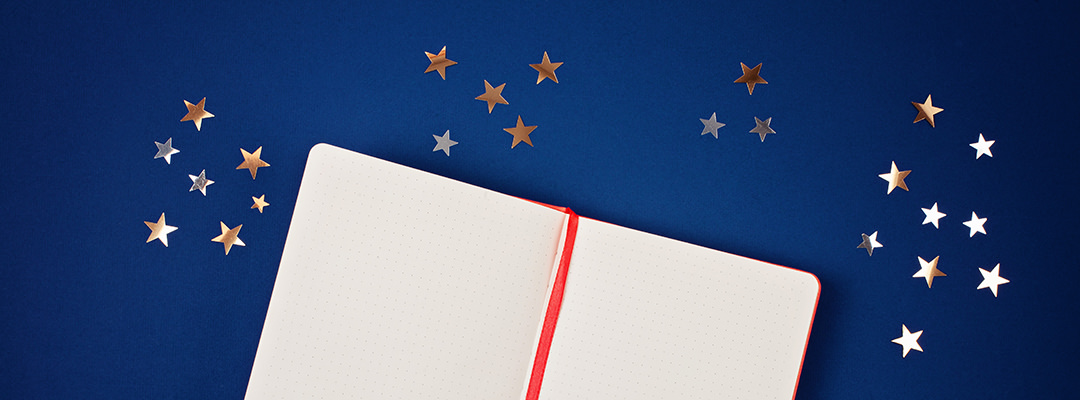How much do you think about your dreams during the day? Unless they’re causing problems in your sleep, probably not a whole lot. But did you know that dreams can actually be super beneficial? They can tell us a lot about what’s going on in our subconscious that we might not have otherwise been aware of. What’s more, they can help us process some of the things we’re dealing with in our waking life and get our creativity flowing. And the best way for us to get the most out of our dreams is by writing them down in a dream journal.
Starting a dream journal is great for helping us sort out what’s happening in our dreams and increase our awareness of what our minds are trying to communicate with us. You might even find that a dream journal improves other areas of your life too. Let’s look at how to get started keeping a dream journal and why you should give it a try.
What is a dream journal?
A dream journal is a record of your experiences while you dream, as well as a tool for understanding them. You can use your dream journal to record scenes that played out in your mind as you slept, images, recurring motifs, feelings you experienced, connections to your real-life events, or creative ideas that were triggered from your dream experiences. There are many, many right ways to use a dream journal, and everyone’s dreaming will be unique.
Most importantly, a dream journal is a place where you can gain a deeper understanding of your dreams, your unconscious mind, and yourself. We’ll talk a bit more about the benefits of dream journaling below.
What medium is best for dream journaling?
So what should you choose for your dream journal? Is there a one-size-fits-all answer? The truth, of course, is that everyone’s different and the type of dream journal that works best for one person might not be the right choice for you. In the end, the perfect dream journal is one that makes you feel safe, comfortable, and inspired to explore your dreams.
Here are a few options to think about when choosing your dream journal:
Softcover notebooks
Softcover notebooks are great. They don’t hurt if you accidentally fall asleep with them under your face, you can stuff them into your bag when you go on holiday or stay at a friend’s house, and you won’t have a minor heart attack if you spill coffee on them while you write. Softcover notebooks are low-key, low-maintenance, and feel comfortable in your hands.
Hardback notebooks
Some people might prefer hardback notebooks for their dream journal. These are sturdier, better for holding up to everyday wear and tear, and come in beautiful and luxurious designs. Writing in a special hardcover book can create a sense of occasion when you record your dreams, making the process and the ideas they create feel even more special.
Audio
If writing isn’t easy for you, or if you have trouble getting your thoughts down on paper, try recording your voice instead. You can use a voice recorder on your phone or an external device. If you do use one on your phone, try to open up the app before you go to sleep so that it’s the first thing you see when you unlock your phone. Spending a lot of time looking for it will expose your eyes to too much light and cause you to wake up faster, which means it will be more difficult to hold onto your dreams. Recording your voice as soon as you wake up can be a great way to lock in your first impressions of your dreams.
What are the benefits of dream journaling?
Now that you’ve found the perfect medium to record your dreams, let’s look at some of the great benefits of keeping a dream journal.
Improve dream recall
Most of us forget our dreams within hours, if not minutes, of waking up. Our brains have a lot going on as we start our day and dreams tend to get sloughed off as less immediately relevant information. Dreams, of course, actually have a lot of relevant information that help us understand ourselves a little better, and dream journaling is a great way to help us remember them more clearly. Even by setting the intention to begin writing things down you’ll find your dreams stick with you more clearly. As you get in the habit of writing down your dreams when you wake up, you’ll find yourself holding onto them more and more. Improving dream recall has even been shown to improve our cognitive memory in other aspects of our life, too.
Help process emotions
Our dreams are one of the ways our mind deals with the overwhelming storm of anxieties, ideas, hopes, and fears that go round in circles during our waking life. In fact, it’s believed that up to 90% of our emotions happen underneath the surface. Even though we might not be aware of them, these subconscious feelings can have a real negative effect on our mental well-being. By taking a wider look at what our dreams are trying to tell us, we can get a better idea of what our minds are dealing with and how best to approach it.
Spark creativity
Dreams are an artist’s goldmine; many writers, painters, musicians, and even perfumers have gotten their ideas from their dreams. Dreams are a fluid, nonjudgmental, free verse space where your brain tosses around all the ideas that may have been somehow inhibited or ignored while you were awake. By tapping into this intimate subconscious archive, you can bring a whole new dimension into your creative pursuits.
Increase self-awareness
Recording your dreams and working to navigate your subconscious mind helps you get to know yourself on a whole new level. You’ll find yourself making new connections about why certain fears and inhibitions exist, how certain relationships have affected you in ways you might not have understood before, and how to feed your own strengths to positively affect your waking world. By becoming more truly self-aware, you’ll find yourself more in control than ever of your own fate.
How to get the most out of your dream journal
Ready to start uncovering your dreams? Let’s look at the best ways to use your dream journal for the most positive impact.
Begin as soon as possible
Keep your dream journal or recording device right beside your bed so that you can begin as soon as you wake up. Once you slip out of sleep and into proper wakefulness, your dreams will start slipping away fast — try to get them down as quickly as possible.
If you can, we recommend beginning your journal on a weekend or on holiday. This is because when your alarm goes off you’ll be jolted suddenly out of sleep and your brain will start jumping ahead into your morning routine, making it more difficult to hold onto your dream fragments. If you begin on a day when you can wake up gently of your own accord, you’ll find it easier to remember them before they drift away. This way you’ll have made a start developing the habit and encouraging your dream recall by the time you have to go back to waking up with your alarm.
Record your immediate impressions of your dream, including images, people you recognize, and especially your emotional responses. They won’t always match, and that’s perfectly okay — if you dream of a childhood home with nothing but happy memories and find yourself experiencing discomfort or fear, that’s entirely valid and you can worry about making sense of it later. Write it all down.
Consider drawing
If words aren’t working for your particular sensations that day, try drawing. This can be a literal interpretation of something you saw in your dream, or just a doodle that reflects the sort of emotional response you experienced. You can also use a combination of words and pictures to encompass the full breadth of an experience. Trust your subconscious and get the ideas down on the page however you can.
If you’re using an audio device to record your voice, you still don’t need to feel limited to only the most literal observations. You can talk about tactile sensations, memories triggered by your dreams, and any other observations that feel like they have a place in your record.
Take five
While some people like analyzing their dreams immediately after writing them down, we recommend giving your dreams a bit of space before going over them — once a week is a good benchmark, but a minimum of three days. This gives you a chance to come back with a new, objective perspective that you wouldn’t have had while still sorting through your dreams.
When you give yourself some distance before coming back to your dreams, it will be easier to pinpoint recurring themes, motifs, settings, colors, and messages that are consistent throughout your dreamscape. When you look at the factors that your recent dreams all have in common, you’ll have a much better idea of what your brain is working to process through those dreams and what it means.
Skip the analysis books — for now
It’s so tempting to try and figure out what your dreams mean with the help of detailed “dream guides” full of charts and lists of common dream motifs. This takes a lot of the work out of your processing and self-reflection. The problem with these guides is that they work on the assumption that everyone has the same relationship to these motifs. That, of course, isn’t true.
For instance, if you dream about a dog, you might go to the chapter on “pets” and find “dogs” and learn that they symbolize loyalty and human relationships. But is this true of someone who’s afraid of dogs because of a frightening experience in their childhood? Or of someone who recently broke up with a partner because they couldn’t agree about keeping a pet? Or someone who was given their first dog as a child to help them through their parents’ messy divorce? The things we dream about are absolutely unique to every one of us, and in order to truly understand them, we need to think about what these motifs mean in our own life.
When you go back over your weekly dreams, see if you can pinpoint the recurring ideas and then ask yourself what they mean to you. Write down these ideas as well. Once you have a general idea of how your dream metaphors relate to your own life, you can crack open a dream book and see if there are similarities and if the book’s analysis triggers any new insight.
Try dream journaling for insight and self-awareness
As you can see, dream journaling is a great practice for the mind and spirit. In addition to helping you make sense of the emotions that are boiling under the surface, keeping a dream journal will make you feel healthier, happier, and more creative overall.





